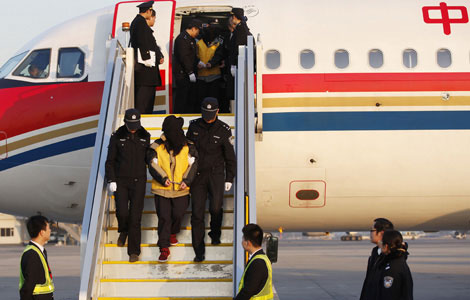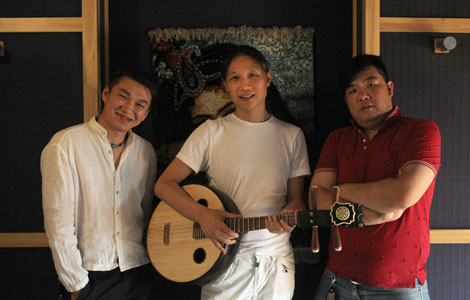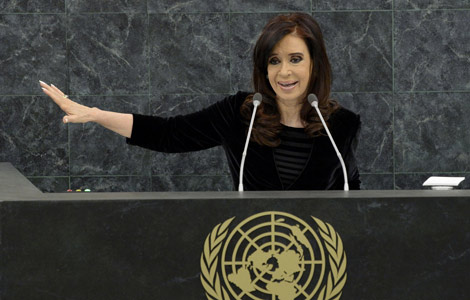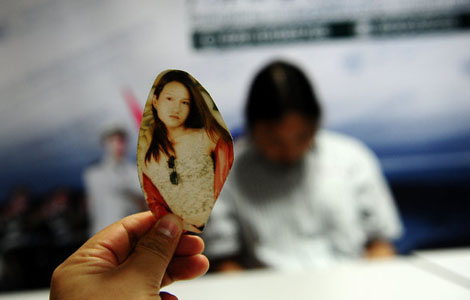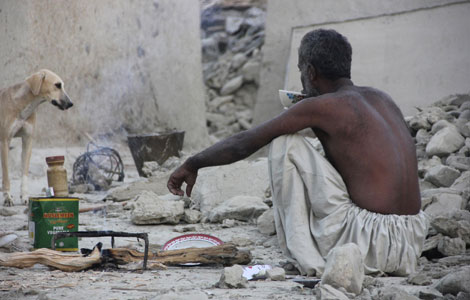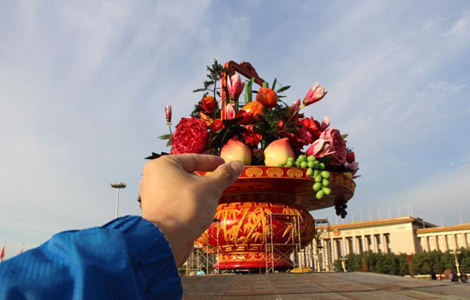Maskman: cyber muckraker rises
Updated: 2013-09-26 02:11
By Mao Pengfei (Consulate-General of the People's Republic of China in New York)
|
||||||||
Like Bruce Wayne, Zhou Xiaoyun also faces his enemies in a DIY outfit -- a pair of sunglasses and a mask. And while he doesn't have access to Batman's high technology, he has at least harnessed the Internet as a powerful weapon.
"With my sunglasses and mask, I'm a muckraker, attending public events and exposing the inside story. Taking them off, I can fade into the crowd like a nobody," said the man who has risen to fame in China as an online crusader for public justice.
A WHISTLEBLOWER
With anti-corruption speeches by China's new political leadership ringing in people's ears, some worship Zhou as a hero. Others attack him as someone chasing fame in the media.
The 38-year-old calls himself a truth teller, "just like the boy in The Emperor's New Clothes."
One of the most striking things this "naughty little boy" has done was to tear off the clothes of one of China's once most powerful government bodies -- the former Ministry of Railways.
Its much-criticized website, 12306.cn, came under renewed fire after Zhou posted two contracts related to the project. They indicated that its cost reached over 500 million yuan (21.7 million U.S. dollar) -- a sum deemed by many as frivolous spending of public funds.
The revelation angered netizens, millions of whom have endured long online queues on 12306.cn to buy tickets.
Ensuing media reports even found that the successful bidder for the suspiciously costly contracts turned out to be a big client of the ministry's affiliated companies.
"I sued the Ministry of Railways because they did not disclose the bidding information as I asked," said Zhou, rapping the desk with knuckles. "It's my civil right to know."
But the accused no longer exists.
The Ministry of Railways was dismissed in March during the annual plenary session of the National People’s Congress, China’s top legislature. This was widely believed to have something to do with the Ministry’s corruption scandals and heavy monopoly.
In early July, its former minister Liu Zhijun was given a suspended death penalty for taking bribes and abusing his power and its former deputy chief engineer Zhang Shuguang, was charged on Sept. 10 with bribe taking.
This is not the first time he has fought the authorities, like an ant against an elephant.
In 2012, he raised the hackles of the Chinese public and made powerful men sweat under collar by revealing scandals like yogurt and jelly made from discarded leather shoes, and former corrupt officials reemployed by local government.
This whistleblower has even proudly written it into his resume that he "brought down a departmental-level official within 10 days."
A TRUTH DIGGER
Does Zhou worry about his safety? His answer is no.
"I posted my evidence under my real name, meaning that I'm totally responsible for what I said on the Internet," he said. "When my revelation becomes a public event, I'm safe under netizens' attention."
Actually, his revelation follows a series of rules to protect himself.
"My targets are mainly government organs and organizations, especially those that infringe upon public interests. I never use someone's quote as evidence and I collect evidence through legal means, most from officially published documents," he said.
On his battle field, Twitter-like Sina Weibo, he has won over 144,502 followers, and Han Han, the Chinese cover star of Time magazine with over 10 million of his own followers, is among them.
Besides all the fame on the Internet, however, Zhou lives the life of an everyday working Joe.
In a 40-square-meter apartment, which he rents in the humid downtown of Guangzhou, the capital of Guangdong Province, he lives with a cat, two laptops and over 1,000 books piled and scattered on the floor, the desk and the bed.
From a crayon drawing on the wall, Zhou and his ex-girlfriend stare at their once sweet home, now serving as the "interrogation room" as he surfs the net for scandals.
"My revelation of scandals always come after thorough investigations. They consume all my spare time and my health," he said, with dark circles under rounded eyes, "but facing the lies, I can not keep silent."
In the end of 2012, after nights of investigation, Zhou exposed a mysterious cash flow of 4.8 billion yuan (784 million U.S. dollar) in the annual report of the China Charities Aid Foundation for Children (CCAFC), a government charitable organization whose revenue from donations in 2011 was only about 86 million yuan (14 million U.S. dollar).
He dropped another bomb into China's charity sector, the cleanliness of which has long been doubted.
Jiang Ying, spokeswoman of the foundation, pleaded inexperience in excusing the huge accounting mistake, explaining that a green-handed accountant mistyped 475 million as 4.75 billion in the income column, and then pasted that number into the expenditure column to balance the account.
Under pressure from netizens and the media, Jiang promised during a television interview to make the CCAFC's bank statements public. The next day, however, the organization backtracked on the vow, much to people's astonishment.
"Were they fooling themselves or the public? It's financial cheating!" Zhou growled, his right palm beating the chair arm. "How could a financial statement with such a blunder pass audits of different levels? What were the supervising authorities doing?"
With help from lawyer friends and accountant volunteers, Zhou combed up more financial loopholes in the CCAFC's public reports, and shared them with netizens who have proved hungry for the truth.
"It's my civic duty," he said. "If my finding concerns public interest, I have no right to keep it to myself and the public voice will push the authorities to investigate."
A FORRUNNER
Zhou is in the vanguard of a new generation of Chinese empowered by the Internet and the will of the government to shine a light on official wrongdoings.
According to the China Internet Network Information Center, the country had 591 million netizens by the end of June, 2013, and over 500 million of them are microblog users like Zhou. More and more individuals are becoming their own personal news agencies.
Under an increasingly common pattern, members of the public are reporting graft online and, as public opinion boils, judicial authorities follow up to dig out the corrupt officials. This new form of corruption busting is gaining popularity with its obvious efficiency.
Liu Tienan, former deputy director of the National Development and Reform Commission, China's top economic planning body, fell from grace after a journalist disclosed his suspected economic violations on the Internet and was put under judicial investigation in August.
If the traditional anti-graft watchdogs still guard the gate for the government, the Internet is open to everyone. As a relatively independent power, cyber anti-graft is redefining China's fight against corruption.
"It's safer," said Zhou, who has been keeping his personal information, including the names of schools he attended and places he works for, from the public.
Liu Zhiguo, one of Zhou's informants, had been imprisoned three times after visiting the State Bureau for Letters and Calls, the authority handling reports of grievances against governments, to inform against the local government for reemploying former corrupt officials.
"Our positions were taken by the corrupt criminals, but no authority came to right the wrongs," said Liu, who turned to Zhou and the Internet in desperation after nearly 20 trips to Beijing. "It was my only choice, and cheaper besides."
Seeing the rise of the anti-graft power on the Internet, the once-secretive anti-graft organ of the Communist Party of China (CPC), the Central Commission for Discipline Inspection of the CPC and the Ministry of Supervision jointly launched an official website on Sept. 2 to employ the new channel.
Wang Yukai, a professor with the Chinese Academy of Governance, said the launch of the website will make online whistleblowing more credible and timely. It will also serve as a platform for authorities and the public to interact with each other and foster more on-line whistleblowers to fight corruption.
But to whistleblowers, the protection is more important, said Zhou, who has been fighting on the Internet under his real name and has been threatened for several times, "there should be legal mechanisms under which revenge against whistleblowers is severely punished."
"Protecting whistleblowers is the best way to encourage real-name tip-offs, so that the public could report without fear," he said.
Most Viewed
Editor's Picks

|

|

|

|

|

|
Today's Top News
UN resolution on Syria's chemical weapons urged
Death toll rises to 328 in SW Pakistan's quake
China gaining market share in military drones
Taipei, LA and Singapore top travel search list
China builds pilot free trade zone to further open up
China reduces intervention and facilitates business
Xi promotes 'mass line' campaign
Youth short on safe sex awareness
US Weekly

|

|
